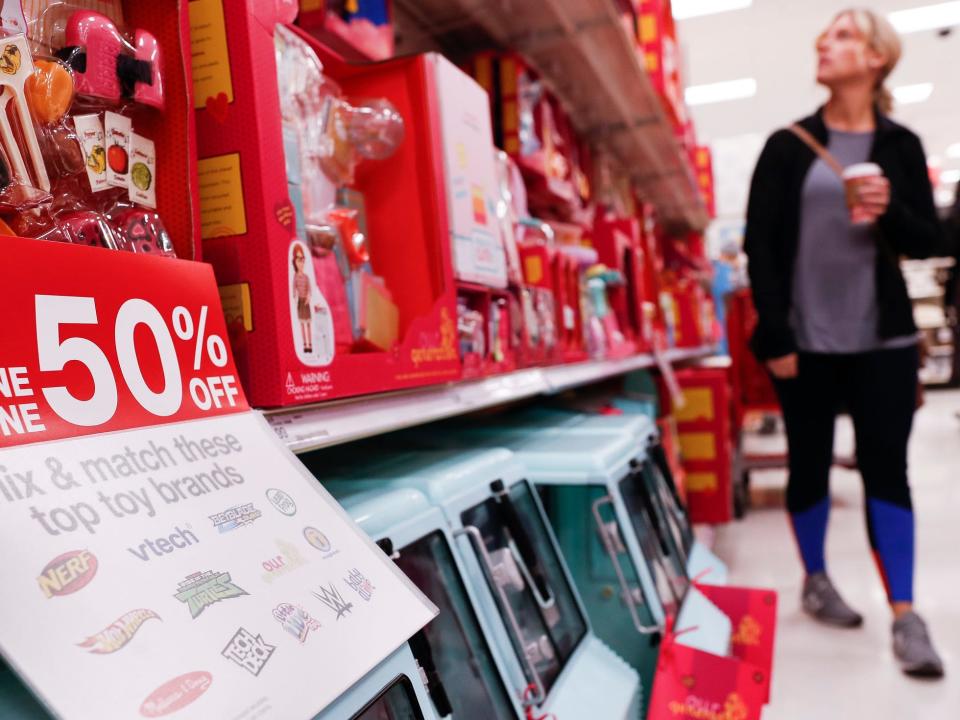Angry shoppers slam new rules preventing Walmart, Target, and Costco stores from selling 'nonessential' items such as toys and clothing in certain parts of the US

AP/John Minchillo
Big-box stores and grocery chains in parts areas of the US are being banned from selling nonessential items by local governments to reduce foot traffic and prevent the spread of the coronavirus.
Vermont and Michigan states are among those to have enforced such rules.
While some shoppers are celebrating these new restrictions, different opinions over what is deemed as essential versus nonessential is creating confusion and irritation among other consumers.
It's no longer possible to shop the entirety of your local big-box store in some parts of the US.
This is because local governments are increasingly taking the stance that stores such as Costco, Walmart, and Target, which have been allowed to stay open during the lockdown because they sell "essential" items such as groceries, shouldn't be allowed to sell nonessential items during the coronavirus pandemic.
Related Video: The Coronavirus May Cause a Global Condom Shortage
This is both to prevent shoppers from spending unnecessary time browsing the store, and thereby limiting their possible exposure to coronavirus, and also to make it fairer to other stores that sell mostly nonessential items and have been forced to close during this time.
Vermont and Michigan states are among the local governments to have rolled out new regulations preventing big-box stores from selling "nonessential" items.
Under Vermont's new regulation, these retailers must "cease in-person sales" of the following products: "arts and crafts, beauty, carpet and flooring, clothing, consumer electronics, entertainment (books, music, movies), furniture, home and garden, jewelry, paint, photo services, sports equipment, and toys," it said.
In Michigan State, meanwhile, any big-box store that is over 50,000 square feet is required to rope off its carpet or flooring, furniture, and paint departments along with its garden centers and plant nurseries.
While some shoppers have welcomed these new restrictions, others are criticizing local governments and the stores themselves for not allowing them to shop freely. Moreover, varying opinions over what should be deemed as essential versus nonessential is also creating confusion:
—R.I. PRINCESS (@Tbezzy112) April 9, 2020
—Ruben Perez (@perezru7) April 8, 2020
—⚔️ 𝕭𝖑𝖆𝖉𝖊 ⚔️ (@BladeT9019) April 14, 2020
—Oh.musical.me (@MusicalOh) April 14, 2020
—ari ward. (@__cheeekk) April 14, 2020
—Deplorable Dave ⭐⭐⭐ (@RealJohhnieDoe) April 14, 2020
—NoWorries (@starryeyedprize) April 13, 2020
In one recent example, reported by Business Insider's Hayley Peterson, a Walmart store in Big Rapid, Michigan mistakenly roped off an area of its store that included baby products, preventing one shopper from buying an infant car seat. These products were not listed as nonessential items in Michigan State's executive order that it put out on Thursday.
A Walmart spokesperson later clarified to Business Insider that customers in Michigan are able to buy infant products, indicating that these items should not have been roped off.
"We are reiterating this direction with store management to ensure consistent service to our customers across our Michigan stores," the spokesperson said.
Read the original article on Business Insider

